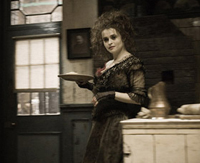2008
Main Movie
Page
Atonement
Boy in the Striped Pajamas
Brideshead Revisited
Counterfeiters
The Dark Knight
Enchanted
Frozen River
Indiana Jones and the Kingdom of the Crystal Skull
Iron Man
Juno
Man on Wire
Michael Clayton
No Country
for Old Men
Rachel Getting Married
the Savages
The Secret Life of Bees
Sweeney Todd
There Will Be Blood
The Visitor
WALL-E
Film
Reviews from 2007
Film Reviews
from 2006
Sweeney Todd
Burton (Batman, Edward Scissorhands, Charlie and the Chocolate Factory) and longtime collaborator Johnny Depp take on the daunting task of adapting the award winning musical play into a film. However, the results are disappointing. Burton is well known for his visual style, and, in the present case, the world of 19th Century London is dark, devoid of light and color, with the exception of the all-pervasive red blood. Burton sees the tale as a horror story, which indeed it is. However, what sets Sweeney apart from other slasher movies is its music with unexpected beauty and wit, amidst the contrasting darkness and horror that surrounds it. In Burton’s film, the music is almost an afterthought. It’s there, but never as the ironic force of beauty, wit, and innocence, it’s meant to be. Rarely do we hear Sondheim’s best songs performed to their fullest. What a tragedy! It’s rare that I think a movie is too short these days, but, Burton sacrificed too much of the music to bring the three hour play into a two hour movie.
Burton does create a few nice moments: Mrs. Lovett’s dream of retiring at the seaside becomes a colorful, witty Victorian bathing scene, in stark contrast to the darkness of London. Even the final, bloody shot has its own tragic beauty to it. But the redeeming moments are, unfortunately, too few and far between. It’s hard to imagine what a moviegoer without any previous knowledge of the musical would make of Burton’s film. From the looks of people in the audience with me, I think they only wondered what this bloody exercise was all about. It’s a shame that the grand, tragic vision of a great musical play is all but lost in this film. Tom Condon, OP (St. Martin) |
WINNER: Golden Globe: best film musical and best actor in a musical for Johnny Depp "While Hairpsray could be seen as a parable of the reign of God, Sweeney is a vision of hell itself." The USCCB Office for Film & Broadcasting classification is L -- limited adult audience, films whose problematic content many adults would find troubling. The Motion Picture Association of America rating is R -- restricted. Under 17 requires accompanying parent or adult guardian. |
subscribe to
DomLife.org and receive a free email update every two weeks. unsubscribe |



 During the opening credits of Sweeney Todd, it appears to be
raining blood. This must be director Tim Burton’s way of
preparing the audience for what’s to come. Before the film
is over, the audience is treated to the spectacle of blood spurting,
gushing, and gurgling from many a slashed throat. Certainly, blood and
violence are essential to the story of the crazed barber of Fleet Street. Broadway
audiences did not know how to respond to the spectacle when it opened
almost 30 years ago. Although critically acclaimed, Sweeney was
not an initial hit. Over the years, it has gained a reputation
for its magnificent score and depiction of the nature of evil. While Atonement tells
of the consequence of one lie, Sweeney tells the story of evil
rooted in the terrible injustice which sends an innocent man away to
prison, while a corrupt judge takes Sweeney’s wife and daughter
into his home. Driven mad, Sweeney eventually kills that which
means more to him than anything. In the meantime, Mrs. Lovett,
Sweeney’s partner in crime, bakes the flesh from the dead bodies
into meat pies. Needless to say, Sweeney Todd is hardly
your typical musical. While Hairpsray could be seen as
a parable of the reign of God, Sweeney is a vision of hell itself.
During the opening credits of Sweeney Todd, it appears to be
raining blood. This must be director Tim Burton’s way of
preparing the audience for what’s to come. Before the film
is over, the audience is treated to the spectacle of blood spurting,
gushing, and gurgling from many a slashed throat. Certainly, blood and
violence are essential to the story of the crazed barber of Fleet Street. Broadway
audiences did not know how to respond to the spectacle when it opened
almost 30 years ago. Although critically acclaimed, Sweeney was
not an initial hit. Over the years, it has gained a reputation
for its magnificent score and depiction of the nature of evil. While Atonement tells
of the consequence of one lie, Sweeney tells the story of evil
rooted in the terrible injustice which sends an innocent man away to
prison, while a corrupt judge takes Sweeney’s wife and daughter
into his home. Driven mad, Sweeney eventually kills that which
means more to him than anything. In the meantime, Mrs. Lovett,
Sweeney’s partner in crime, bakes the flesh from the dead bodies
into meat pies. Needless to say, Sweeney Todd is hardly
your typical musical. While Hairpsray could be seen as
a parable of the reign of God, Sweeney is a vision of hell itself.  If you have not seen a good staging of Sweeney, it may be hard
to imagine its greatness. Stephen’s Sondheim’s score
is extraordinary: rich, dark, full of rage, unexpected tenderness,
and even wit. The audience is commanded to “Attend the tale
of Sweeney Todd” at the very beginning of the stage musical. Could
this story of injustice, madness, violence, and cannibalism for the sake
of capitalism have something to say to a modern audience? Indeed
it can, probably more so now than 30 years ago when it was written. Unfortunately,
the screen version, carries none of the weight of the stage production. With
the exception of a couple of effective set pieces, and snippets of the
music, the film only seems grotesque.
If you have not seen a good staging of Sweeney, it may be hard
to imagine its greatness. Stephen’s Sondheim’s score
is extraordinary: rich, dark, full of rage, unexpected tenderness,
and even wit. The audience is commanded to “Attend the tale
of Sweeney Todd” at the very beginning of the stage musical. Could
this story of injustice, madness, violence, and cannibalism for the sake
of capitalism have something to say to a modern audience? Indeed
it can, probably more so now than 30 years ago when it was written. Unfortunately,
the screen version, carries none of the weight of the stage production. With
the exception of a couple of effective set pieces, and snippets of the
music, the film only seems grotesque.  Depp and co-star Helena Bonham-Carter (Burton’s longtime companion)
are capable actors, but do not have the voices to attempt such a demanding
score. Both of their performances seem sadly one-note: they
wear the same grim expressions under their excessive makeup throughout
the film.
Depp and co-star Helena Bonham-Carter (Burton’s longtime companion)
are capable actors, but do not have the voices to attempt such a demanding
score. Both of their performances seem sadly one-note: they
wear the same grim expressions under their excessive makeup throughout
the film.